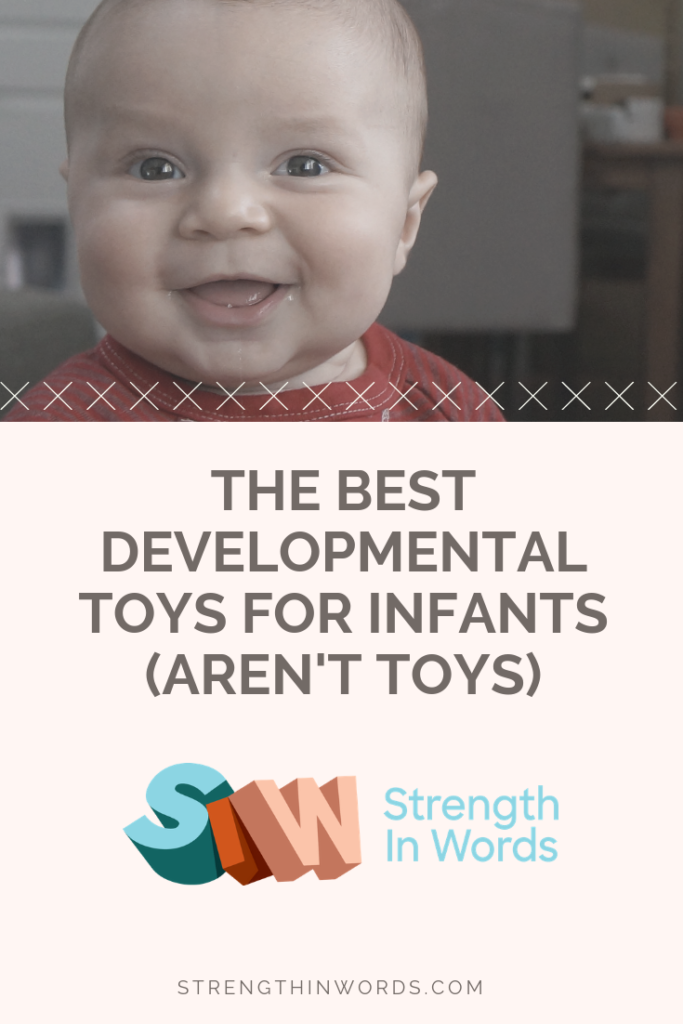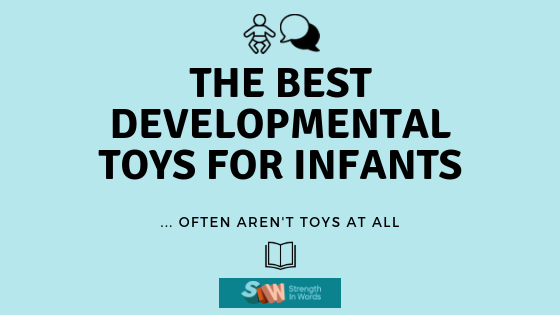What are the best developmental toys for infants?

When a baby comes into our lives, there are a lot of “should’s.”
I should be feeding my baby / putting my baby to sleep this way.
I should feel an instant connection to this beautiful bundle.
I should know what to do instinctively.
New parents are under enormous societal and self-imposed pressure to “get it right.” Often, our first instinct is to ask the question, “what do I need to get to stimulate my baby’s development?”
And then, “what in heaven’s name am I supposed to do with my baby once she’s fed, bathed, and cuddled?” One mother recently recalled to me that those peaceful moments when the baby was fully rested and alert terrified her the most.
Even if we think we know…
Even if we come into parenthood knowing something about child development, the arrival of a baby shakes our confidence to the core.
As a sleep-deprived, overwhelmed parent, you’re looking for resources that are straightforward and impactful, but not overly-simplistic. You want to maximize your interactions with your baby so you can encourage and support your baby’s development.
If only you could simply upload useful information to your brain or click one button and have the “right” things magically appear – efficiency is king in these early days, weeks, and months!
Once your infant starts to do more than eat and sleep, you want to know what materials to have on hand, how to use those materials, how they’re going to developmentally impact your baby, and what to say to harness their power.
You know you’re “supposed” to be talking and singing and showing them toys… but how is that supposed to look? How are you supposed to do it?
Here’s the thing:
It’s not about the stuff. You don’t need to fill up your shopping cart with things that claim to be “learning toys.” Your baby isn’t going to be “behind” if she doesn’t have access to the most expensive collection of wooden toys – and she’s not going to miss out if the play room is missing toys with flashing lights and animal noises.
It’s about the connection between you and your baby. It’s about the quality of the interaction during short bursts of active, alert time. It’s about the little, everyday routines in which you’re already engaging (whether you work full-time or home is your work).
The developmental value of a hand-carved wooden drum and a plastic laundry basket is exactly the same, depending on how you use it.
You don’t have to go out and buy ANYTHING to support your baby’s development. The “best” learning toys for babies are already in your home, or attached to you.
When you recognize the tools you already have to boost your baby’s development, you’re able to maximize the time you have with your baby, you’re empowered to “get it right,” and you’re able to unlock the power of everyday routines and objects to figure out how to play with your baby.
The resources we’ve created at Learn With Less are intended to respect the parent and caregiver as the primary guide, and to educate you on the developmental basis behind the things you’re already doing so that you can do them more often and in new, simple ways.
All you need is a little boost: learn more about how to play with your baby today.
